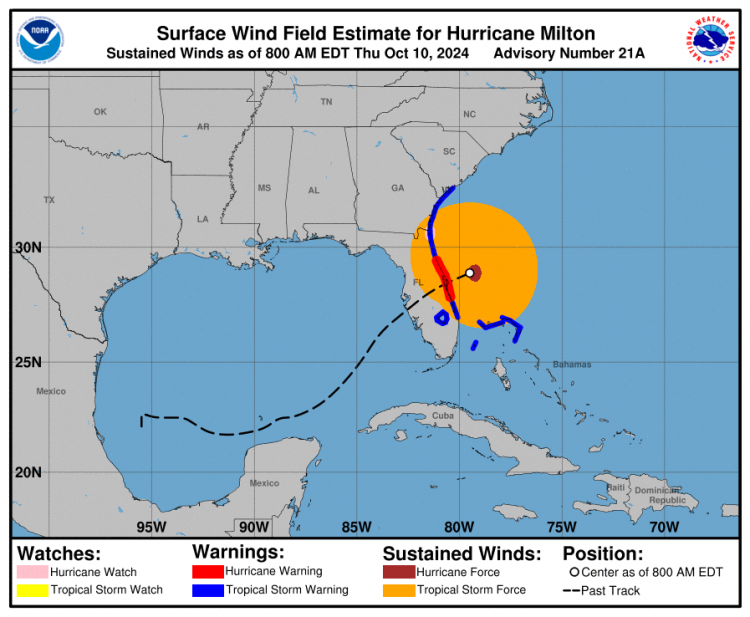Hurricane Milton tore through Florida this week, leaving a devastating trail of destruction in its wake. The storm, which made landfall on Florida's west coast as a Category 3 hurricane, spawned deadly tornadoes, wiped out power for more than 3 million residents, and left communities struggling to recover from yet another catastrophic weather event. As the hurricane barreled across the state, it weakened to a Category 1 storm before finally moving out into the Atlantic Ocean on Thursday.
Milton's wrath was felt most acutely in areas still recovering from the devastation of Hurricane Helene just two weeks prior. The storm made its initial impact near Siesta Key, a small barrier island near Sarasota, with sustained winds reaching 120 mph. The wind and rain battered communities along the Gulf Coast, tearing open roofs, toppling trees, and flooding streets from Tampa to Fort Myers.
One of the most alarming aspects of Milton's rampage was the series of tornadoes that touched down across the state. At least 19 tornadoes were reported, with significant damage recorded in areas like Fort Pierce, where two deaths were reported in a retirement community due to a suspected tornado. St. Lucie County Sheriff Keith Pearson estimated that around 100 homes were destroyed in the area. "All this happened instantaneous," said Fort Myers resident Connor Ferin, describing the chaos as his home lost its roof and filled with debris.
Governor Ron DeSantis confirmed that nearly 125 homes were destroyed across Florida, many of them mobile homes that stood no chance against the force of the storm and the tornadoes it triggered. "We are looking at a catastrophic level of damage," DeSantis said, noting that the state had deployed 9,000 National Guard personnel and 50,000 utility workers to assist with rescue and recovery efforts.
In Tampa, the hurricane's winds caused significant structural damage, including ripping the roof off Tropicana Field, the home stadium of the Tampa Bay Rays. A large construction crane also collapsed in St. Petersburg, narrowly avoiding nearby buildings as it crashed to the ground. Despite these impacts, Tampa Mayor Jane Castor expressed relief that the feared catastrophic flooding did not materialize. "We'll have storm surge damage but nothing like it could have been. It could have been catastrophic for Tampa Bay," Castor told MSNBC.
Milton's powerful winds also left much of Florida without power. More than 3 million homes and businesses were plunged into darkness as the storm downed power lines and disrupted utilities. While the worst of the storm moved out to sea, crews were working tirelessly to restore electricity, clear debris, and ensure that communities could begin the recovery process as quickly as possible.
President Joe Biden, who had previously described Milton as "the storm of the century," emphasized the life-threatening nature of the hurricane at a White House briefing, urging residents to follow evacuation orders and take the necessary precautions. "It's a matter, literally, of life and death," Biden said, as he pledged federal support for the ongoing relief efforts.
In addition to the widespread damage to homes and infrastructure, Milton's passage disrupted travel across the region. More than 2,200 flights were canceled by Thursday morning, primarily in airports in Orlando, Tampa, and Southwest Florida, stranding travelers and complicating relief logistics.
Amid the human chaos, animal life at Tampa's zoo was also a concern. African elephants, Caribbean flamingos, and pygmy hippos were safely sheltered as the storm passed, with zookeepers ensuring their protection against the severe weather conditions.
FEMA Administrator Deanne Criswell assured the public that resources mobilized for Hurricane Helene's aftermath would not be diverted and that additional supplies, including millions of gallons of water and meals, were already en route to the affected areas. "None of this aid will detract from the recovery efforts for Hurricane Helene," Criswell stated, highlighting the federal agency's readiness to tackle back-to-back disasters.
Even as the worst of Hurricane Milton has passed, significant threats remain. The National Hurricane Center warned that heavy rains and flash flooding could continue to affect areas in east-central and northeast Florida. Residents were advised to stay in interior rooms away from windows and remain alert to the ongoing risk of flooding, with some areas expected to receive up to 18 inches of rain.




